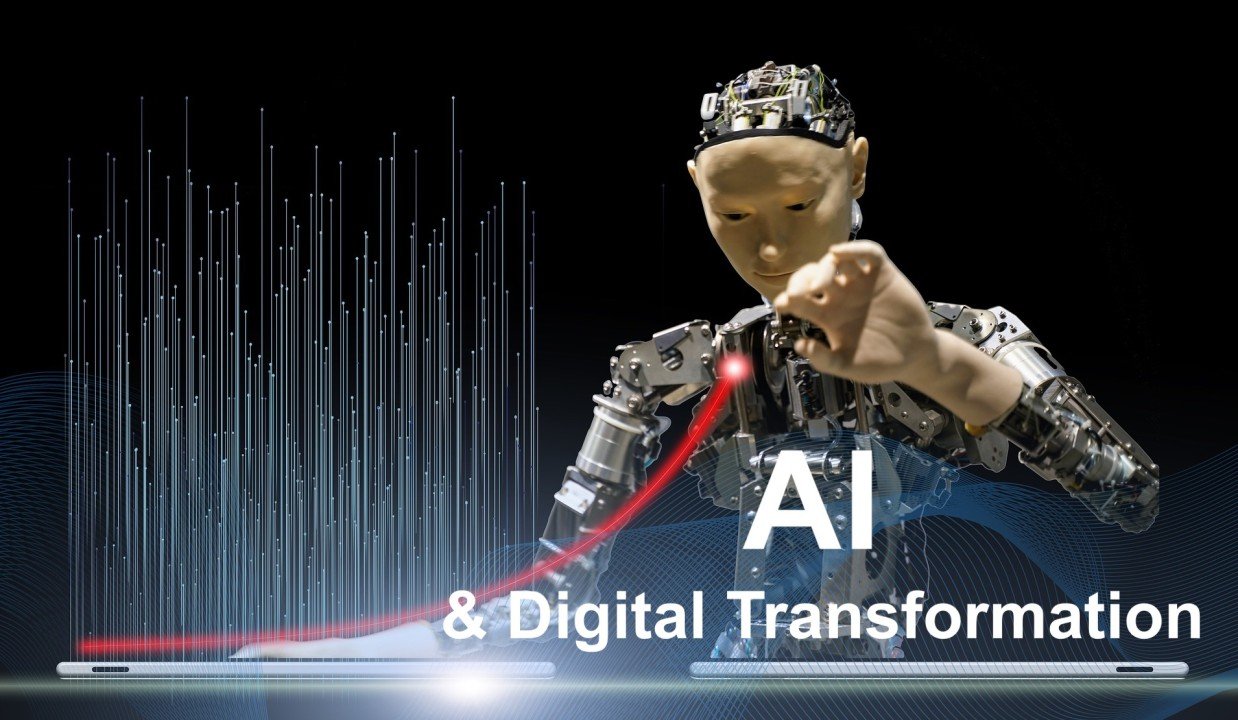AI and Digital Transformation: Shaping the Future of Business

In the ever-developing landscape of technology, Artificial Intelligence stands as a transformative force driving the wheels of digital change. The intersection of AI and digital transformation is not merely a trend but a paradigm shift that is reshaping the way businesses operate, innovate, increase productivity, and deliver value to their customers.
AI vs. ML
AI refers to developing computer systems that can perform tasks that typically require human intelligence, such as visual perception, speech recognition, decision-making, and language translation. AI's inception coincided with the emergence of computers in the 1940s, and the first scholarly paper on neural networks, which form the basis of contemporary AI, was released in 1943.
ML, on the other hand, is a subset of AI that focuses on the development of algorithms and statistical models that enable computers to perform tasks without being explicitly programmed but learned. The field of machine learning was founded by computer scientist Alan Turing in the 1950s. The Turing Test, proposed by him, assessed artificial intelligence by calculating its ability to mimic human behavior to the point where observers cannot distinguish between human and machine responses. Despite numerous attempts to develop an AI that passes the Turing Test, none has succeeded. However, Ray Kurzweil predicted that in 2029, we will pass the Turing test.
Digital Transformation
Digital transformation is more than just a buzzword. It’s a strategic imperative for organizations aiming to thrive in this century. At its core, digital transformation is about leveraging digital technologies to enhance or replace existing processes, systems, and improve customer experiences. It's a holistic approach that encompasses not only technology adoption but also cultural and operational shifts within an organization.
AI in Digital Transformation
Artificial Intelligence serves as the anchor in the digital transformation journey. Its ability to analyze vast datasets, derive meaningful insights, and automate complex tasks has elevated it to a key enabler of innovation. AI applications, such as machine learning and natural language processing, empower businesses to make data-driven decisions, automate routine processes, and enhance customer experiences.
Data as the Fuel for AI
The success of AI in digital transformation hinges on the quality and quantity of data available. As organizations accumulate data at an unprecedented rate, AI algorithms become more sophisticated, enabling deeper insights and predictive capabilities. Therefore, data becomes AI's lifeblood, fueling its ability to learn, adapt, and provide valuable outcomes.
Enhancing Customer Experiences
One of the most significant impacts of AI in digital transformation is its role in enhancing customer experiences. Through AI-powered chatbots, personalized recommendations, automated onboarding, and predictive analytics, businesses can offer tailored solutions, streamline interactions, and build stronger, more meaningful connections with their customers, and reduce churn.
Automation with Generative AI
Generative AI tools are leaving a notable impact across diverse industries, utilizing the capabilities of this technology to accomplish distinctive objectives, such as language translation, content creation, software development and testing, design and art, gaming, analyzing market trends and predicting stock movement, analyzing medical images and predicting patient outcomes.
Top Generative AI Tools
- ChatGPT-4 by OpenAI
- Gemini by Google DeepMind
- GitHub Copilot by GitHub & OpenAI
- Claude by Anthropic
- LLaMA 2 by Meta
Innovative Companies with AI-powered Testing Tools
- Tricentis
- Applitools
- AskUI
- mabl
- Testaify
AI-driven automation is a game-changer for operational efficiency and effectiveness. The following tasks in assuring software quality can be delegated to AI systems, freeing up human resources to focus on more strategic, creative, and complex endeavors.
Use generative AI to:
- Automatically generate test cases based on specifications, requirements, or historical data. This can help in rapidly creating diverse test scenarios, ensuring comprehensive coverage.
- Assist testers in exploratory testing by suggesting new test cases or generating variations of existing test cases using generative models.
- Generate realistic synthetic test data to ensure that your tests cover a wide range of scenarios, including edge cases and outliers.
- Leverage generative models to analyze code changes and predict potential defects before actual testing. This can help in prioritizing testing efforts and identifying high-risk areas.
- Develop adaptive self-healing test scripts that can evolve based on changes in the application's UI or functionality.
- Simulate real-world conditions, such as network fluctuations, device variations, sizes, or user interactions, to ensure your tests are robust and cover different scenarios.
- Utilize generative models to analyze code changes and automatically prioritize test cases based on the areas of the code that are most likely to be affected.
- Automatically document test cases, scenarios, and results reducing the manual effort required in test documentation.
- Employ generative models to assist in the triage process by automatically categorizing and prioritizing reported issues based on historical data, area of application, and the severity of the reported problems.
Challenges and Considerations
However, the integration of AI and digital transformation is not without its challenges. Ethical concerns, data privacy issues, and the need for skilled professionals capable of navigating this evolving landscape are just a few hurdles organizations must overcome. Striking the right balance between innovation and responsible AI usage is crucial.
Looking Ahead
As AI continues to evolve, its role in digital transformation will become even more pronounced. From autonomous systems to AI-driven decision-making, the future promises a seamless integration of AI technologies into the fabric of business operations.
The Future is Now
The synergy between AI and digital transformation represents a pivotal moment in the evolution of technology and business. Organizations that harness the power of AI strategically, aligning it with digital transformation goals, are poised to not only survive but thrive in the digital era. The journey towards a digitally transformed future is not a destination but an ongoing process of continuous learning, with AI as a steadfast companion in this exciting evolution.





